Algeria: In a bloodied nation where tourism isn’t a priority, this intrepid traveler explores an unspoiled culture
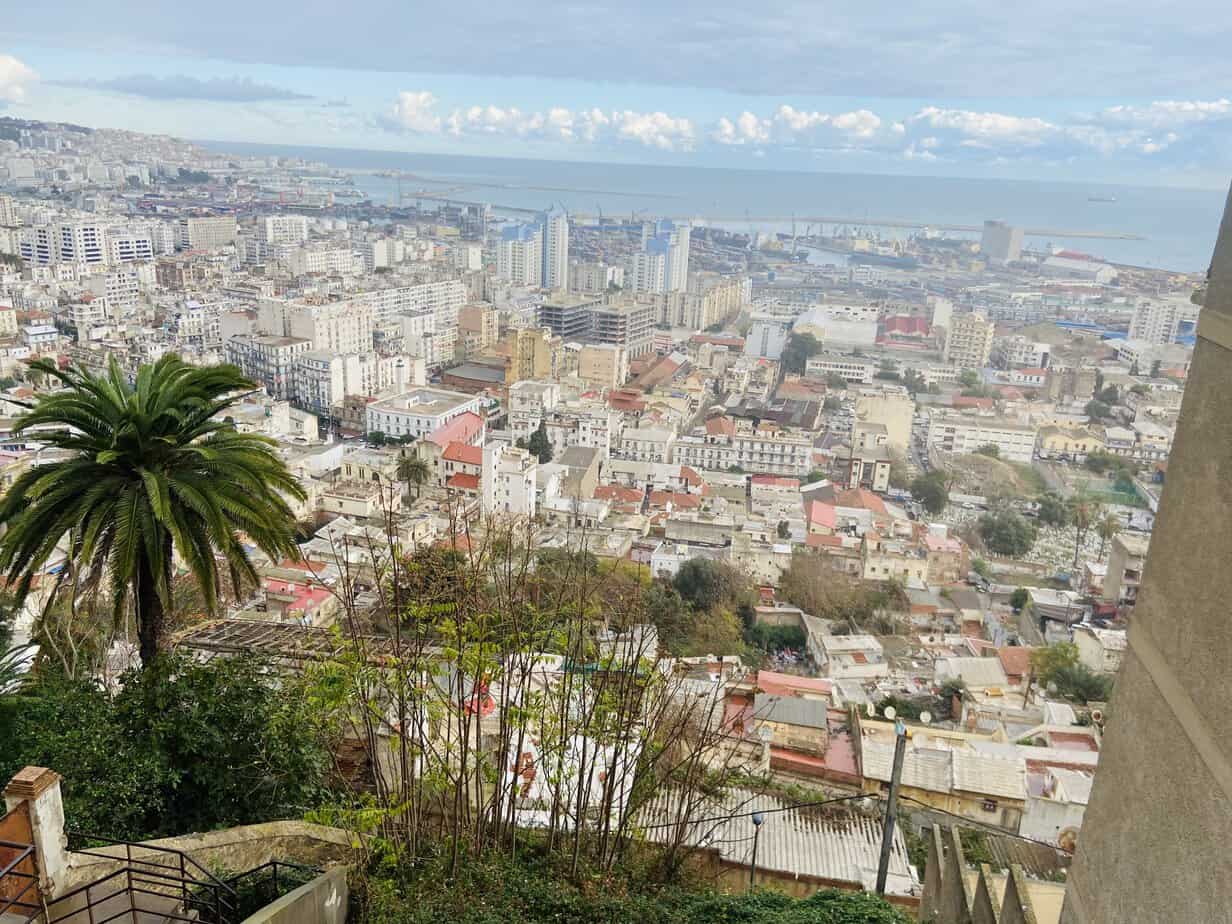
(Director’s note: This is the first of a series of blogs on Algeria.)
ALGIERS, Algeria – It’s not hard to find Algiers’ souk. The marketplace of Algeria’s underrated capital wraps around Martyrs’ Square, the plaza hovering above the charming port lined with palm trees.
I had just changed money in a town where cash machines and credit cards are a couple centuries away from daily life. I walked up the hill and found myself in a place I’d experienced so many times in North Africa. Narrow alleys. Small shops. A mass of humanity writhing through the souk’s dark streets that has been the site of daily commerce since the 10th century.
One big difference: I was the only Westerner. In Morocco, Tunisia and Egypt, the souks were filled with travelers, from world-weary backpackers to naive tourists just off a bus. Algiers’ souk had few souvenir shops selling identical kitsch. No merchant harassed me to come inside to check out his carpet with “a special price.” No beggar stuck out his hand.
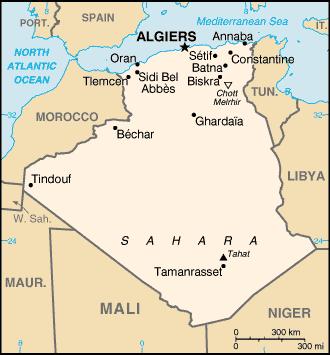
While looking for something to buy and failing, I nevertheless felt energized by this injection of authenticity. I was alone with the Algerians. In a post-Covid world where a record 1 billion people traveled last year, in this rapidly shrinking world it’s harder to find windows into true culture. In Algiers’ souk I felt a moment of triumph.
Why Algeria?
It’s a big reason I came to Algeria.
This trip wasn’t so much getting in touch with my inner Muslim. I do like Islamic countries. Algeria was my 18th. I like the call to prayer when the air fills with the melodic voices, however scratchy, billowing out from hundreds of mosques. I like the people who are aware of the world’s unfair stereotypes and want to change them.
And I like the food. Don’t knock camel burgers until you’ve tried one.
Algeria was also convenient. Last year I joined Travelers’ Century Club (TCC), a group reserved for people who’ve been to at least 100 countries and loosely defined territories. Every two years the Spain-based Mediterranean Chapter organizes a group trip to some exotic locale. This year it was Algeria.
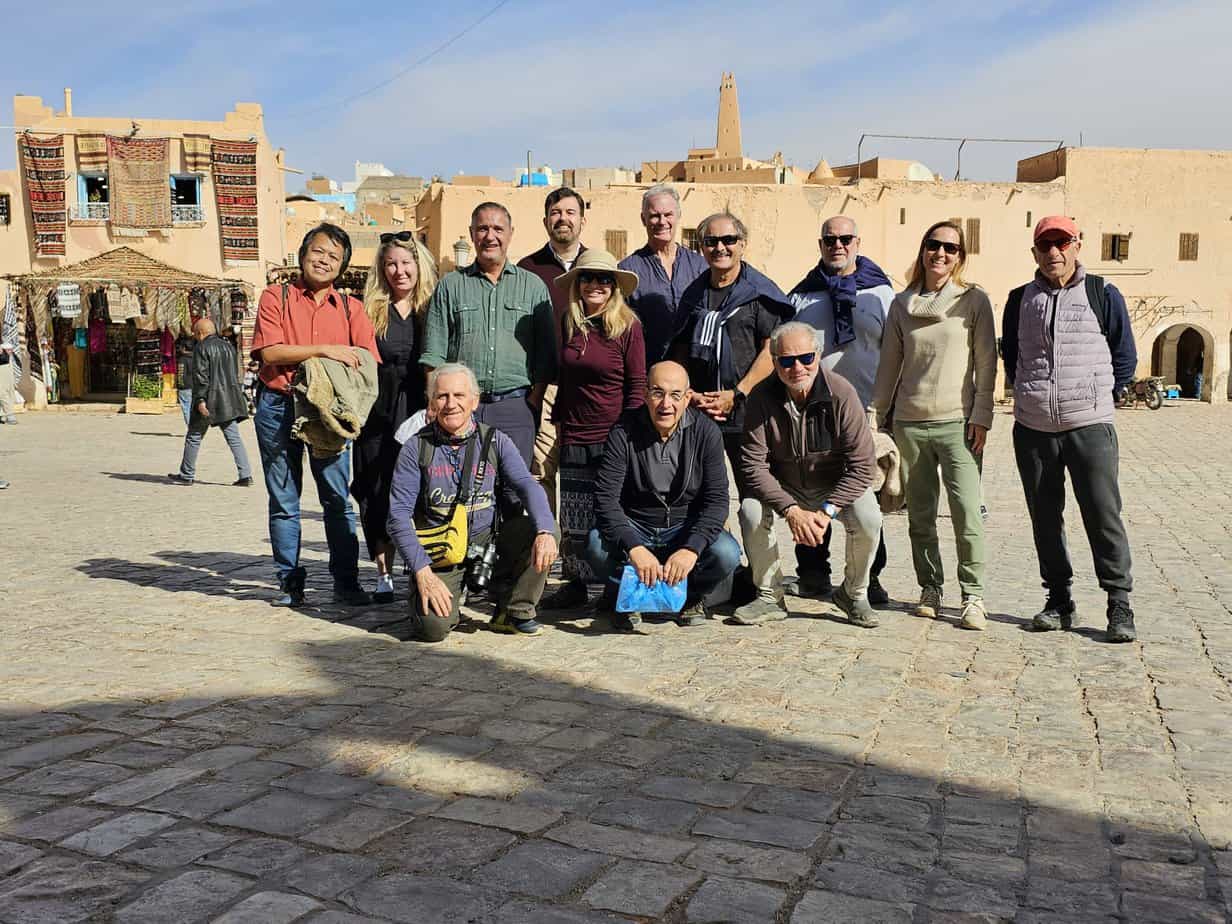
Normally, I avoid group travel. I’m a bit of a loner. I like organizing everything, going at my own pace and reacting to impulses, however wild. It’s easier to meet locals. Marina, my girlfriend and photographer, is the same way. We’re both low maintenance (except for her insistence on a breakfast buffet at every hotel).
But Algeria is different. It’s difficult. Traveling in Algeria is a puzzle. Getting visas for independent travel can be extremely challenging. The policies are inconsistent. Going anywhere south of Algeria’s Mediterranean coast requires permits, guides and a police escort. I heard stories of people waiting three years for an independent visa.
Domestic flights are torturous as Air Algerie, the national carrier, schedules most of them at night. I had three flights that departed between 11 p.m.-1 a.m. I survived my first two days of my nine-day cross country journey on exactly five hours sleep. That included three in a tent in the middle of the Sahara Desert.
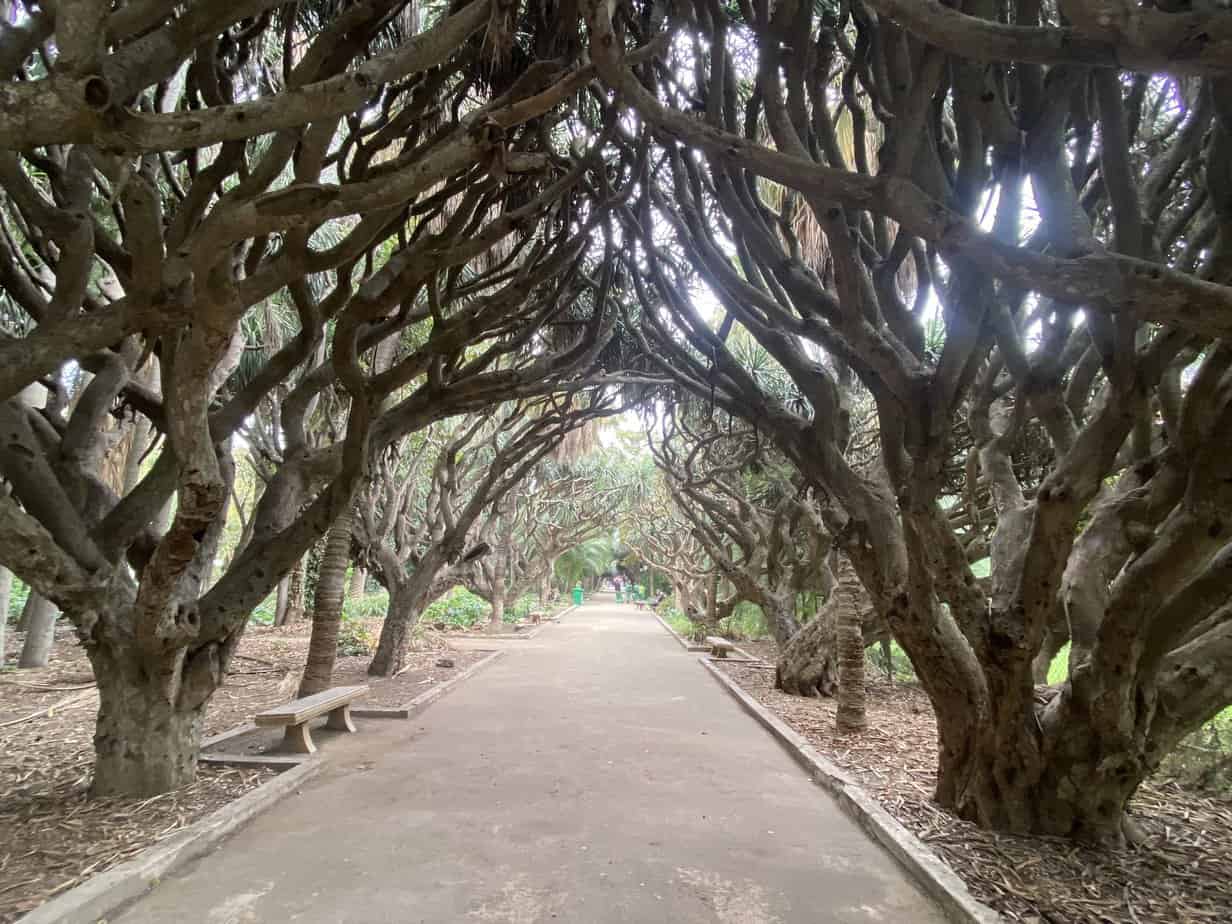
The best way to organize a trip this complicated and not smash your laptop in frustration is through an agency. TCC hired out Algieria Tours 16 which deftly handled all the details, from visas to flights. For a lump sum, I had my entire itinerary confirmed and emailed to me. The only thing not included were meals, and Algerian food is surprisingly excellent and spectacularly inexpensive. It’s one of the best bargains in world travel.
Traveling with 13 others became a non-issue. Hailing from six different countries, these were all travel-hardened adventurers who’ve seen much more of the world than I have. A Taiwanese named Wen-Hung Kuo has been to 180 countries and 270 on TCC’s list. Our group’s conversations ranged from the attractions of the Central African Republic to the best ways to avoid getting kidnapped in Haiti.
Algeria off beaten path
It’s hard to comprehend that the largest country in Africa and 10th largest in the world is off the beaten path. But this nation that could almost fit Alaska and Texas inside it only had 2.4 million visitors in 2019, 111th in the world. Visa difficulties, a bloody civil war just 30 years ago, a government content on living off its massive hydrocarbon profits, all add up to a country that views tourism with a tired yawn.
Lonely Planet doesn’t even have a travel guide for Algeria. Lonely Planet has a travel guide for Rotterdam.
Yet Algeria has seven UNESCO World Heritage Sites and 3,000 archaeological sites, perfect for the intrepid traveler to explore. And explore I did.
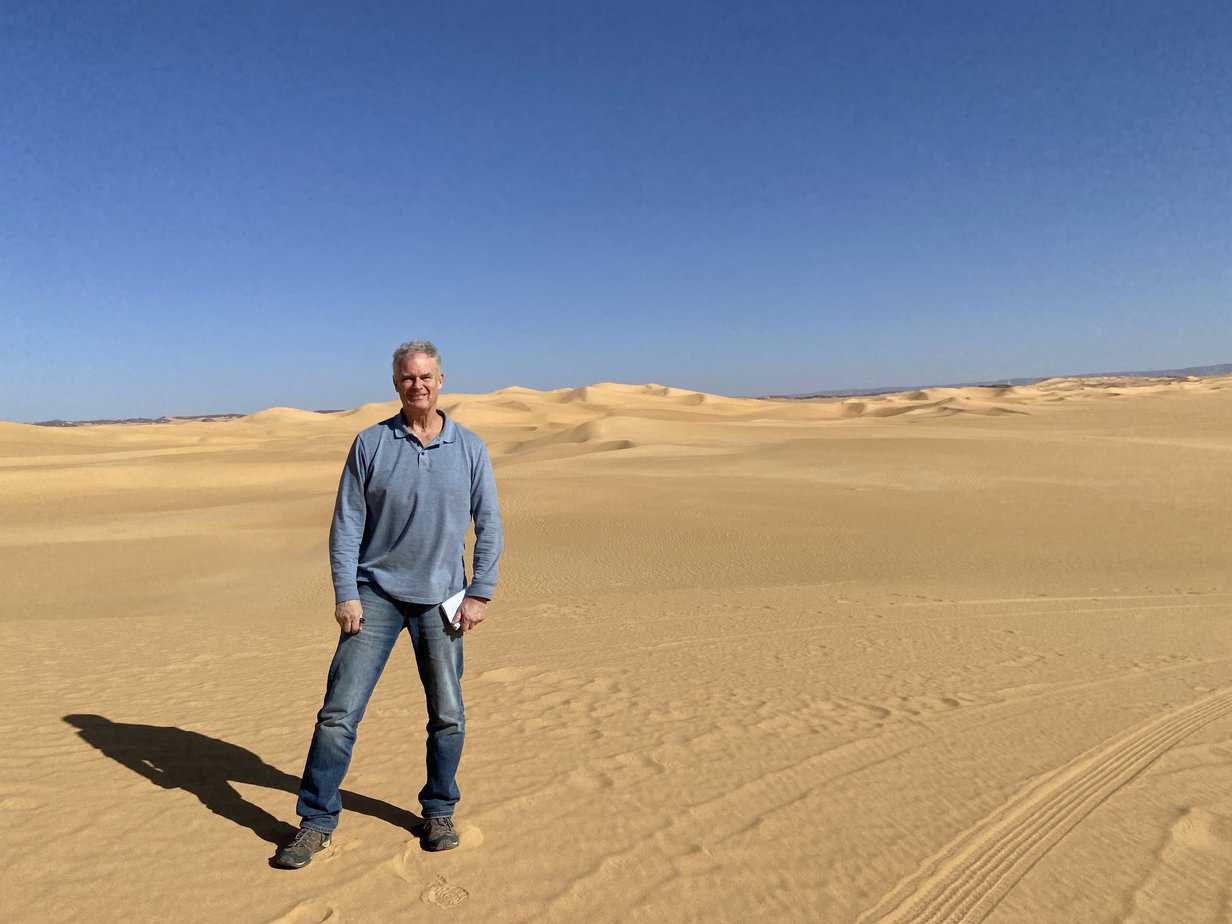
What I did
To wit:
- I camped in the deep Sahara Desert, roaring along in a Land Cruiser, flying up sand dunes that looked like meringue frosting and seeing rock carvings from 8,000 B.C.
- I visited Ghardaia, Algeria’s holiest and most conservative city where married women covered up everything but one eye and often turned their backs and hid when I passed.
- I roamed three of the 500 cities Ancient Rome built when it ruled North Africa from the 1st century A.D. They were better preserved than any I’ve seen in Italy.
I will cover the above in future blogs. But first, to understand Algeria, one must understand its history. It’s bloody. It’s sad. It’s infuriating. For a quick overview, on my first full day I went to the National Museum of the Moudjahid.
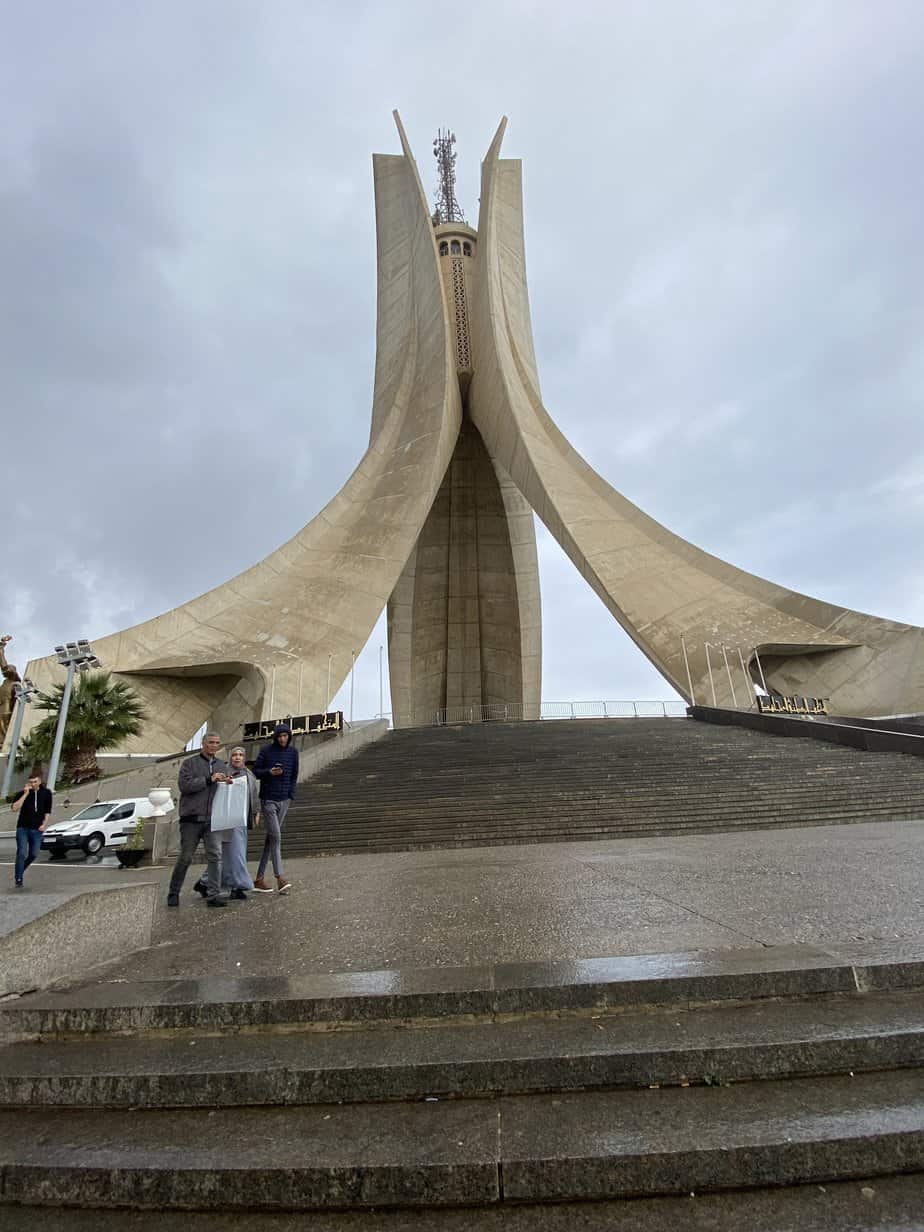
Moudjahid is Arabic for “Martyr” and it’s housed below the Martyrs Memorial, three giant standing palm fronds on a hill beaming Algeria’s green, white and red national colors for the entire city to see at night. To reach it, I took Algiers’ excellent subway to Hama station and walked about 400 steps – steep steps – up a narrow staircase.
I passed shuttered windows and closed gates of crumbling two-story buildings. At the top I saw a small lot with dozens of garbage bags next to the carcass of a broken down car, pilfered for parts. Stray cats, looking surprisingly well fed, prowled the grounds.
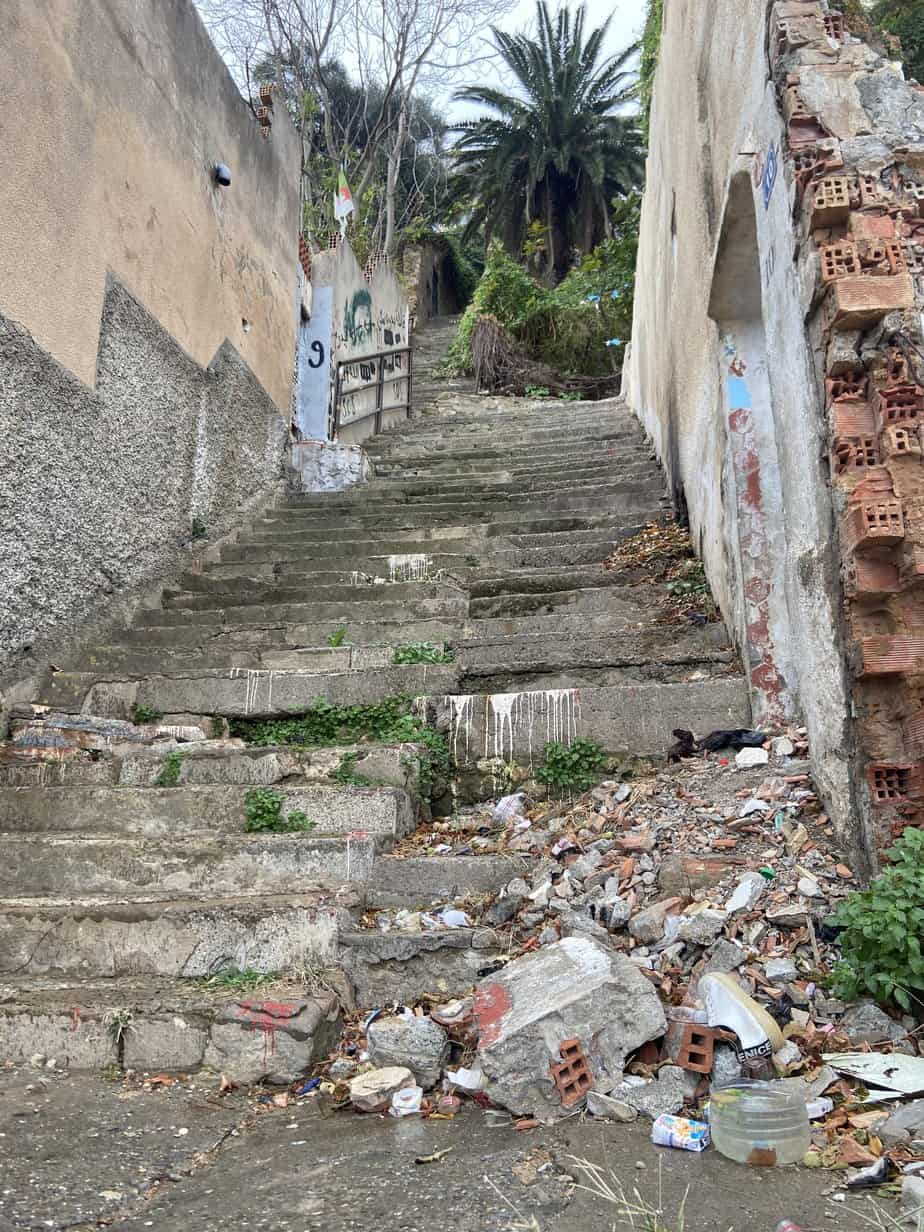
But walking along the busy boulevard to the monument, I had a stupendous panoramic view of the capital. The city of 2.9 million is spread along the Bay of Algiers with high-rise apartment buildings and a bustling port showing the fruits of the fourth-largest economy in Africa.
The history
What it went through to get there is what the museum revealed.
Algerians are bilingual. They speak Arabic and French with equal fluency, the result of French rule from 1830-1962. From 1830-75 French invaders killed approximately 825,000 Algerians. Combined with disease, Algeria lost one-third of its native population. The French lost 3,300.
From 1825-47, 50,000 French moved to Algeria, taking advantage of the warm climate, long Mediterranean coastline and French rule. At one time, Algeria had more French than Algerians.
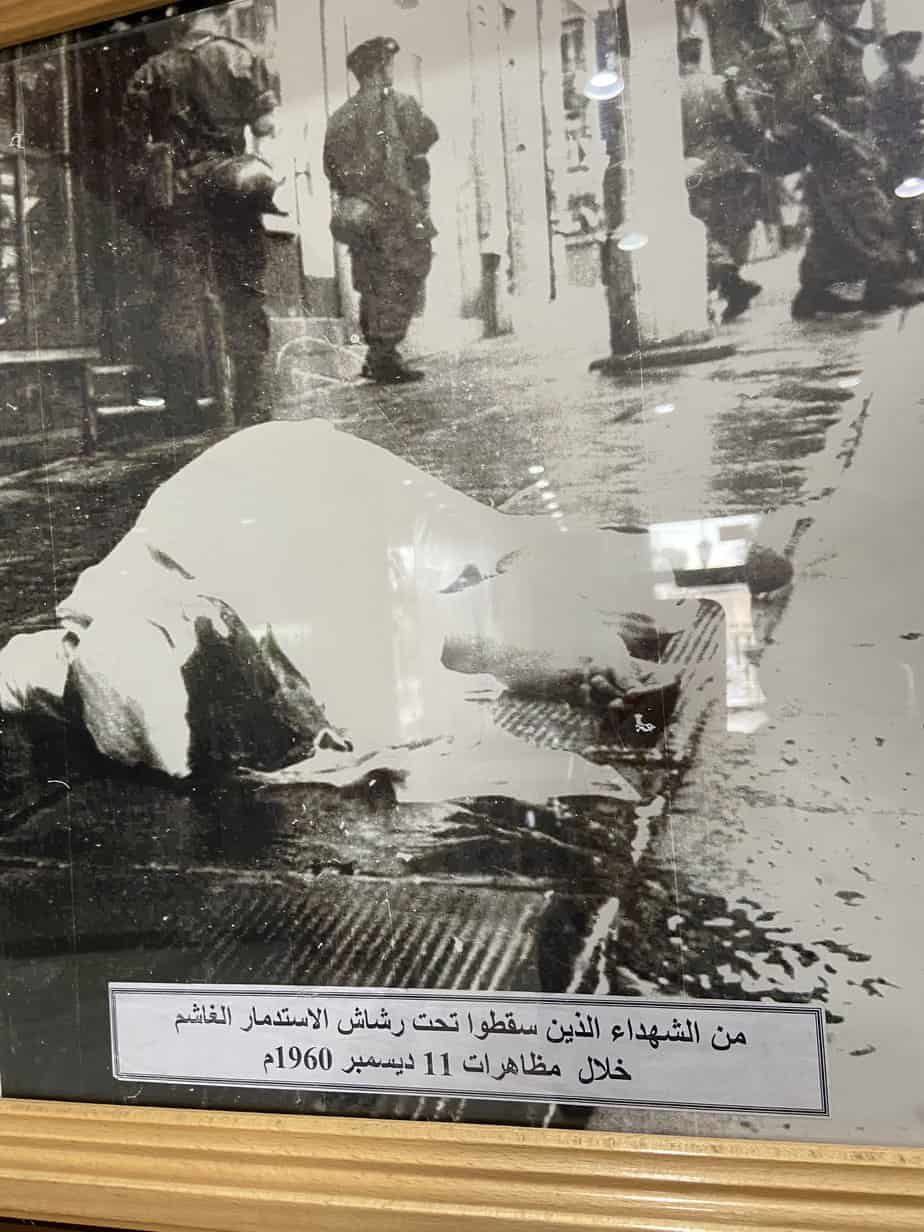
When the natives had enough and started the Algerian Revolution in 1954, the French destroyed 8,000 villages and put 2 million in concentration camps. Algeria claims losses of 1 million. The French lost 150,000.
But they were finally granted independence in 1962. Over the next two years, 900,000 Europeans fled the country.
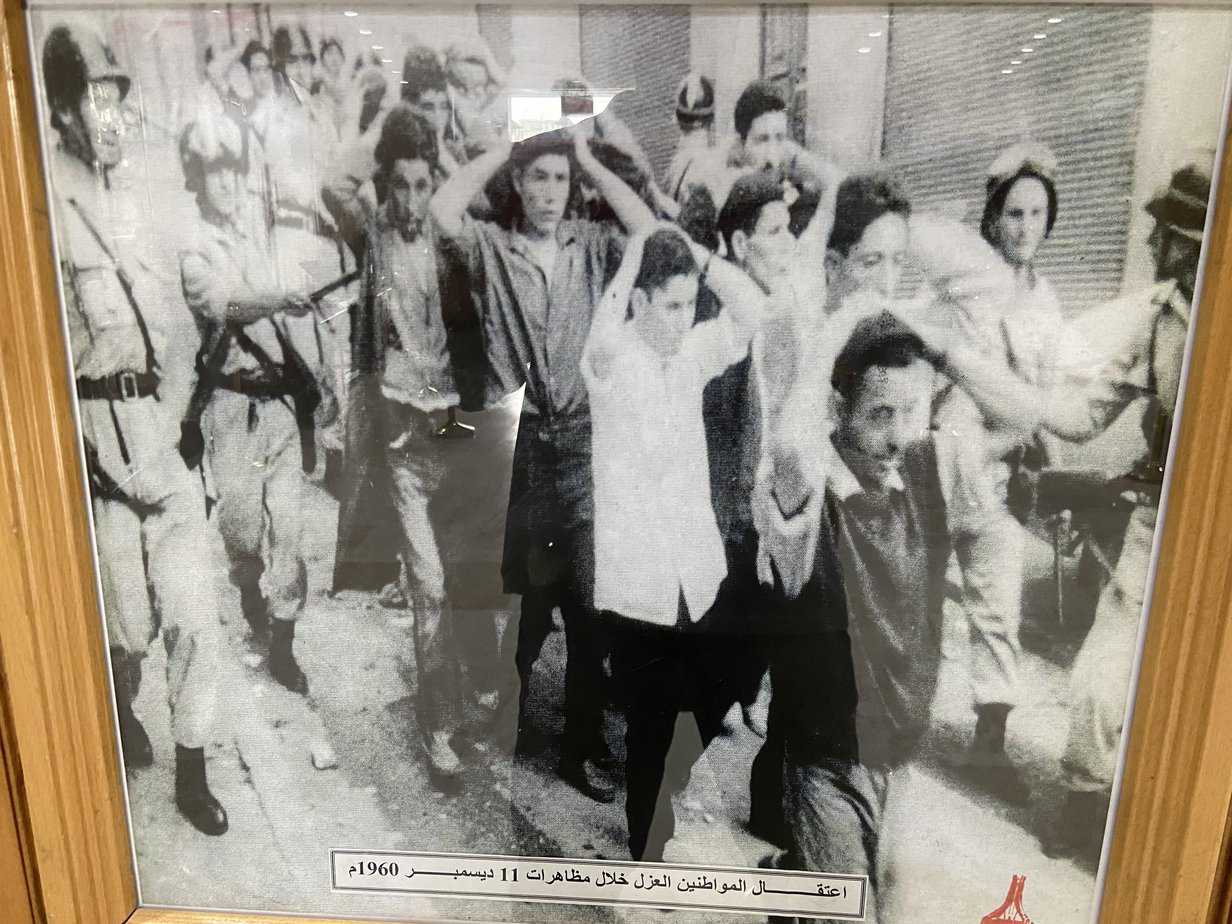
The museum has Arabic and French descriptions. But you don’t need English to understand the long string of gruesome, black-and-white photos of the bloody war. White tarps covered bodies with blood spreading out from underneath. Corpses piled atop each other in the middle of Algiers streets.
It looked just like photos from Italy’s mafia wars.
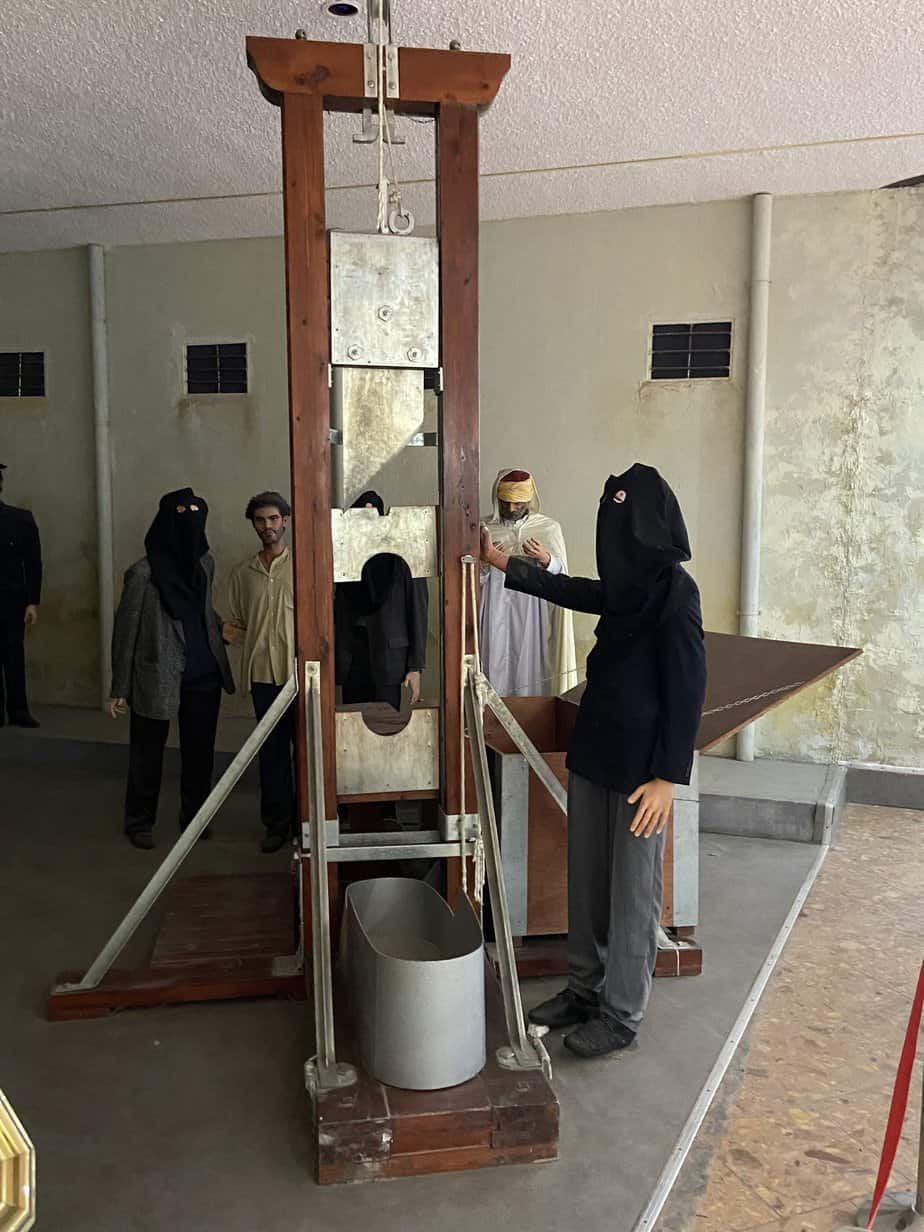
One room features a lifesize guillotine the French used for the real uppity. Next to it stood an Islamic holy man speaking from the Koran and two guards behind the shackled mannequin representing Ahmed Zahana, a top revolutionary leader who was guillotined in 1956. He was 30. One painting shows French police throwing angry Algerian immigrants off a bridge in Paris in 1961.
With Arabic music playing in the background, the museum made me wonder how the proud Algerians feel about the French today. I was still alive when they whacked Zahana. I asked our guide in Ghardaia, a college-educated man in his 20s, if the locals still resent the French.
“Most people think it’s silly to think like that,” he said. “What happened happened.”
It makes sense. When I visited Vietnam, the Vietnamese didn’t resent me for 2 million Vietnamese killed during the Vietnam War and the U.S. bombing half the country back to the Stone Age. And that happened a decade after the Algerian Revolution.
The museum doesn’t include the Black Decade, the Algerian Civil War from 1992-2002 when the Algerian government fought various Islamic rebel groups. More than 100,000 died. That was barely two decades ago.
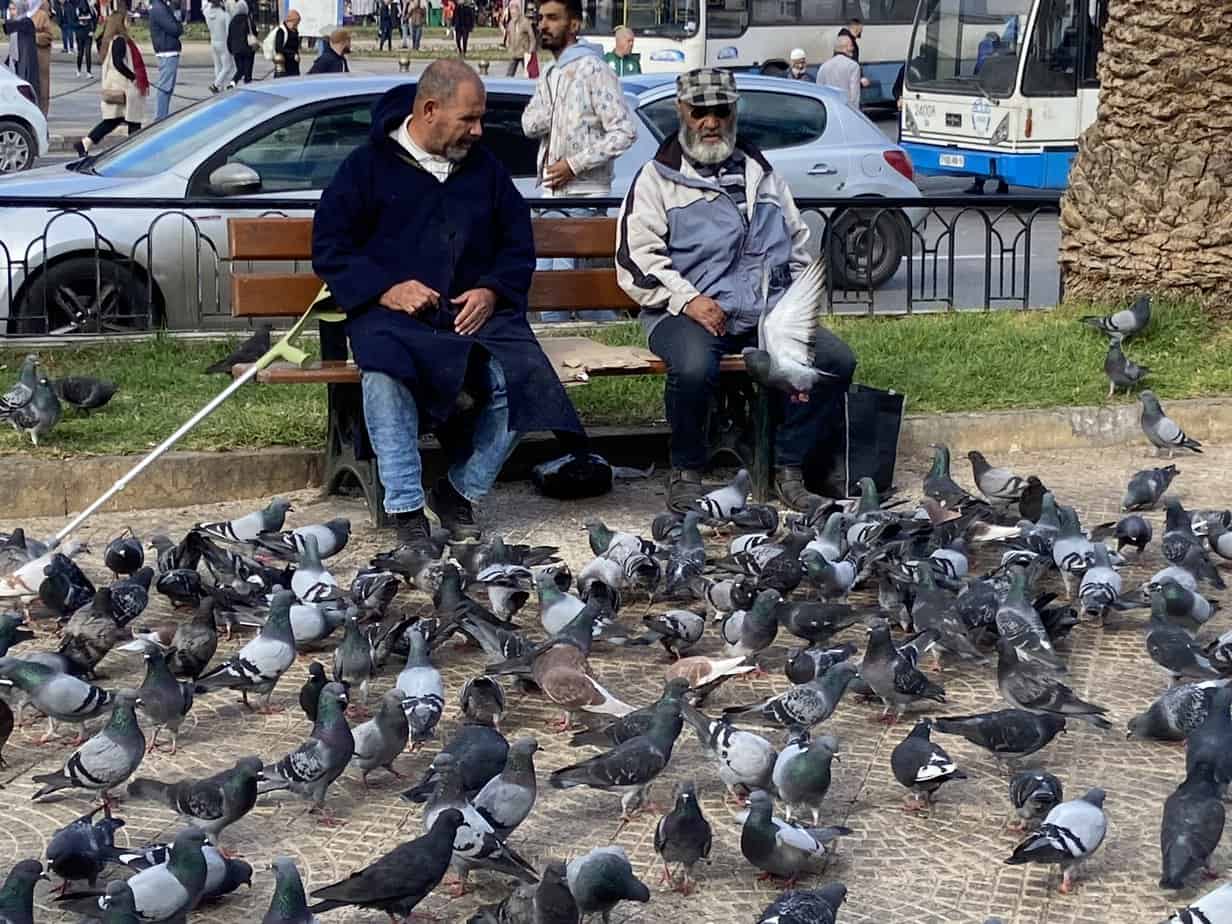
Martyrs’ Square
The Algerians have earned their peace. I lost count of how many locals told me with a big smile and knowing nod, “Welcome to Algeria.” I saw it especially in Martyrs’ Square. It’s on the northwest tip of the city. It overlooks the bay where couples stroll the promenade. A gazebo is covered with pigeons who flock around the feet of anyone who sits down with a piece of bread.
The gleaming white Djama’a el Djedid mosque stands near the long, white French colonial building with cast-iron balconies that stretches the length of the port. It’s a nice place to relax, get a cheap meal in one of the many local cafes after a couple hours exploring the souk. If you get hungry, you’re in a good place.
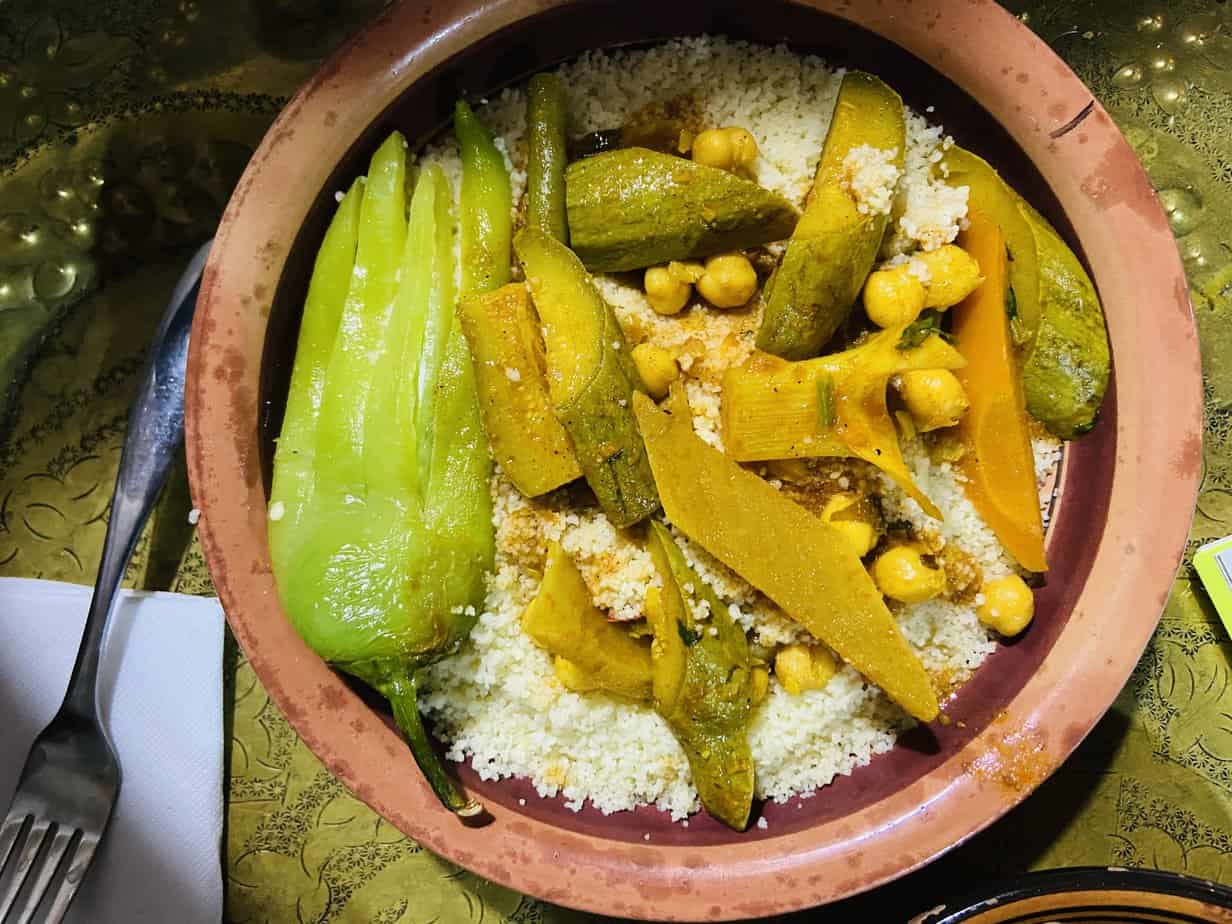
Algerian food
The French left two things the Algerians will never forget: 1 million dead and good food. Algerian cuisine was the biggest surprise of my trip. Like in neighboring Morocco, it’s Arabic food with French twists. I had couscous, the national diet staple made of coarsely ground durum wheat and covered in a thick vegetable stew and, upon request, a big steamed chicken breast you could cut with a fork. You can get it all over the country for a couple euros.
In Ghardaia I fell for Meghlogha, kind of a pizza made from two, big round pieces of flat bread filled with carrots, onions, tomatoes, hot pepper and garlic. It’s even cheaper at 250 Algerian dinars or about €1.
On my last night in the country I treated myself to El Djenina, romantically lit and elegantly decorated. Red, blue and green lights shined from a chandelier. I had lamb with meatballs covered in cumin and spice, accompanied with a free bowl of warm, spiced carrots and a basket of various Algerian breads. At 2,600 DA (about €11 euros), it was the most expensive meal I had in Algeria.

Drinking in Algeria
No one comes to Algeria to party. At least, they shouldn’t. Unlike Egypt, Morocco and Tunisia where bars and local beer are aplenty, Algeria is nearly a dry country. They do sell alcohol in special shops. I asked, “But isn’t alcohol against the Koran?”
One local in Guardaia said, “We’re not all Muslims.”
In the airport in Constantine, another ancient Roman city, I met an Algerian lounge singer who sang at the Sofitel in Algiers. She invited me to come watch. She sang from 1-2 a.m. I don’t like music enough to stay up that late. It would also be difficult to explain to Marina.
But the Sofitel did serve beer and while I didn’t miss alcohol over my nine days in Algeria, I did miss the atmosphere bars provide for locals. I took a taxi to the Sofitel, a five-star palace with a giant door shaped like the pointy Islamic-style windows.
The place was empty except for a couple in the corner, four Algerian men in an animated conversation and two bored guys at a nearby table. Another scruffy guy in a ball cap sat down at the bar near me and ordered a Beck’s. They all looked like locals.
The bartender said the Sofitel has no lounge singer. Not caring, I ordered an Algerian beer. The Beaufort, at 4.5 percent alcohol, was pretty good, primarily because I’d spent a week in the Sahara. At 800 DA (about €4) it was outrageously expensive by Algerian standards.
I asked the bartender if he gets many Algerians. He said yes and seemed surprised by the question.
“We are Muslim,” he said. “But we drink. We drink beer. We drink wine.”
Bored, I asked him to confirm what I heard that the only place to drink in Algiers are five-star hotels. He recommended a bar near the Martyrs Memorial called Cosmopolitain.
The taxi dropped me off. It was about midnight. I walked into a dark, sleek, long, spacious bar that could be right out of Santa Monica if it wasn’t for the Tunisian rock music and music videos filling the bar. Beautiful women with long, jet black hair and fashionable shoes sat at nearby tables. Some slowly danced to the music with their male companions.
I ordered a Beaufort and asked the bartender about the clientele. He said it’s about 80 percent Algerians then said, “Welcome to Algeria! Do you want to listen to English music? Pink Floyd?”
No, in Algeria I prefer Berber rock.
Soon, a large Beaufort plopped in front of me. The owner, sitting behind me, bought me one. He came over and said, “Welcome to Algeria!” His name was Amir and he also runs Fine Goods Wine & Spirits, an import company.
As Another Brick in the Wall, by, ahem, Pink Floyd, played, he told me about how Algeria has come together in recent years.
“When the situation is bad, we have good solidarity,” he said.
We clinked glasses. Ala sahhtik! (Cheers!)
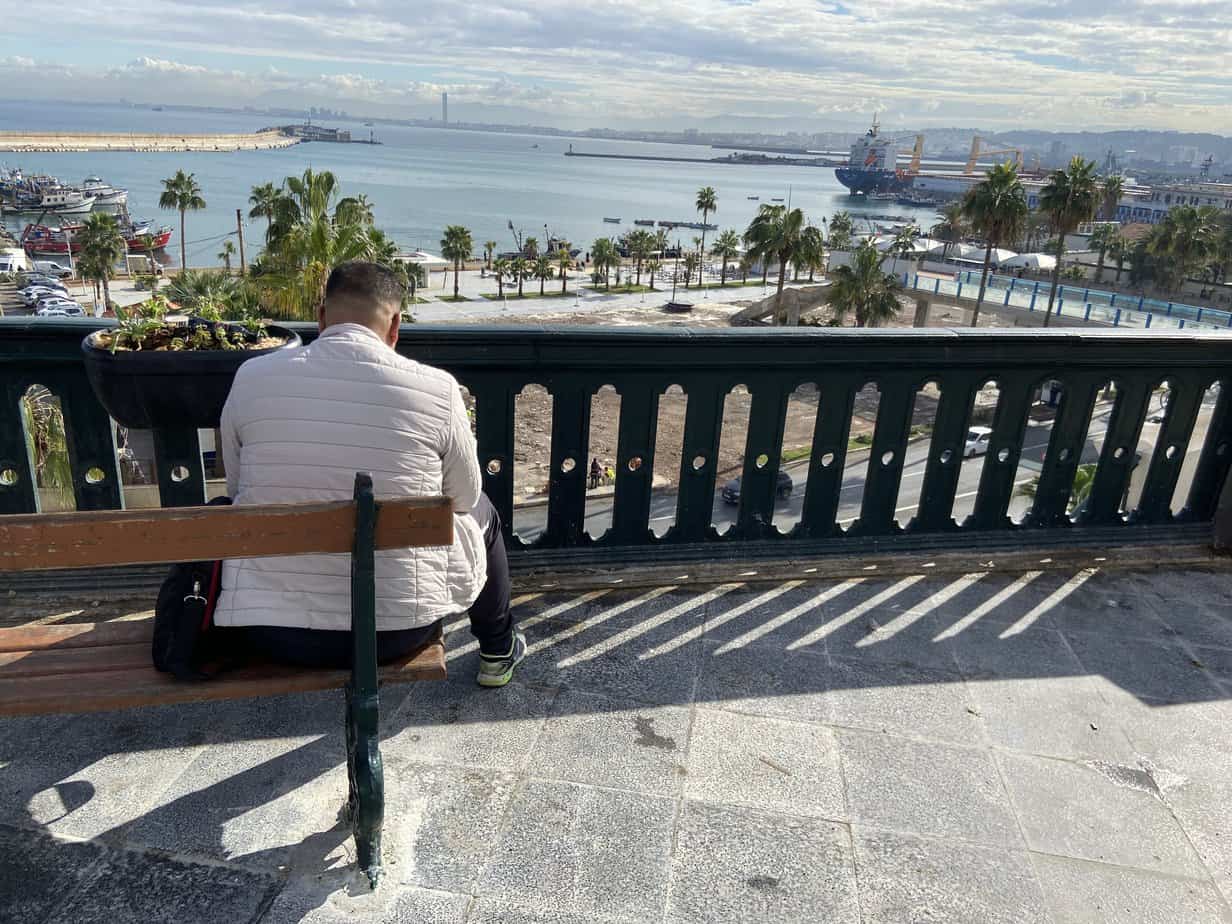
If you’re thinking of going …
How to get there: Air Algerie flies to Algiers from 31 countries but not the U.S. You can fly Lufthansa from Montreal with stops in Lyon, France, and Frankfurt for $698 in January. Air Canada and Air Algerie flies through Paris for $770.
How to get around: Algiers’ public transportation is excellent and cheap. Its clean subway is 25 cents and taxis are inexpensive. However, if you want to leave the Mediterranean coastline, you need permits, guides and police escort. It’s best to go through a travel agency. TCC used Algeria Tours 16, https://www.facebook.com/Algeriatours16/?_rdc=1&_rdr, 213-773-62-0805. Owner Wassim Allache, is well traveled and is fluent in six languages. He handled everything for us with nary a wrinkle.
Where to stay: City Hotel, 72 Rue Hassiba Ben Bouali, Algiers, 213-44-078-704/08, www.cityhotelalger.com, cityhotelalger@gmail.com. It’s as basic as its name but has nice, clean rooms in a working-class section of Algiers near the water. Staff is helpful and chatty. Doubles start at €52 including breakfast.
Where to eat: El Walima, 22 Rue Ahmed Zabana, Algiers, https://www.facebook.com/profile.php?id=100094598992395, elwalima16@gmail.com, 11 a.m.-11 p.m. A 10-minute walk from City Hotel, El Walima has the breadth of Algerian cuisine in an atmosphere resembling the inside of a desert tent. I ate there three times. Try the couscous with chicken, the national diet staple. Mains start at €2.50.
Where to drink: Cosmopolitain, Bois des arcades, Klosque 3, Algiers, 213-550-030-303, Noon-3, 7 p.m.-1 a.m. Sunday-Thursday, 7 p.m.-1 a.m. Friday-Saturday. Hip, modern bar near the Martyrs Memorial. Cocktails, beer and foreign wine. Also a full tapas menu. A good place to meet locals.
When to go: Algiers has fairly mild temperature. High season is November-April when highs range from an average of 64-70 with lows in the low 40s. It tops 90 in summer. Our temperatures in the desert were low 50s and neared 80 at midday. Avoid summer in the Sahara. Temperatures have hit 122 (50 celsius).
For more information: Tourism Algeria, https://www.tourismalgeria.com/index.html, info@tourismalgeria.com.
(Next: Camping in the Sahara.)


December 15, 2023 @ 5:27 pm
Awesome. Looking forward to the rest of the blog series!
December 15, 2023 @ 7:03 pm
Thanks, Spencer. I look forward to writing it.
January 2, 2024 @ 4:01 pm
Fascinating. The world is full of so many assumptions to be shattered by travel and a conversation or two with locals.
January 2, 2024 @ 5:43 pm
Thanks, Janet. As I’ve said, if every American had visited at least one Muslim country, we never would’ve had the Iraqi War.
June 7, 2024 @ 11:03 pm
I’m Algerian living in Australia , thanks for sharing your experience, it seems like you have not enjoyed much your time there , as of reading your blog , you haven’t mentioned the beauty of the Algerian city and its wonders , since Algeria is so underrated and lacking tourism , your words are dull and blunt towards Algeria and I find it quite disappointing, since Algerians are too welcoming and are the most friendliest Nation on earth , there are many things to see and discover in Algeria and 9 days are not enough ,your narrative is cold , that’s how I felt while reading . There are many other travellers whom genuinely said facts about Algeria and I guess you missed yours .
June 11, 2024 @ 8:31 am
Gee, I thought I> was very complimentary of Algeria. Did you read my subsequent blogs about the country?